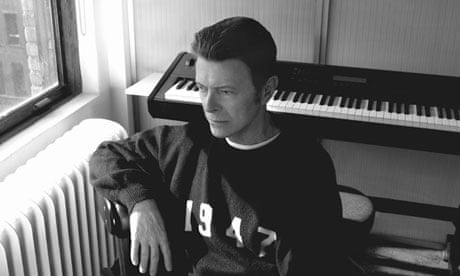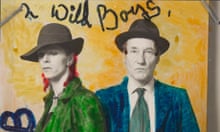The thought of their own mortality does peculiar things to people. Often it makes elder statesmen release records such as Johnny Cash's American Recordings suite – a final corpus of work that retroactively imparts all that came before with more gravitas.
In his seventh decade, David Bowie remains unlike all the other old dudes. Death stalks his 24th album – one crafted in secrecy redolent of the tomb. But it isn't necessarily Bowie's own death. The Next Day is packed with murderous tyrants, school massacres-to-be and snipers wishing they were dead. Its killer line has just a frisson of autobiography, from a singer whose work has rarely been self-referential, at least not in the mewling sense. "I stumble to the graveyard and I lay down by my parents," Bowie sings on I'd Rather Be High, "Whisper: 'Just remember, duckies, everybody gets got.'"
A heart attack truncated Bowie's last tour back in 2004. Obituaries might well have been kept on standby thereafter as this once-dissolute pop star, one who had repurposed emaciation into a Romantic trope, became a near-recluse. Had Bowie's final word been 2003's serviceable Reality, his legacy as the British art-school pop star nonpareil would have retained its rude health. If there were one final single – Where Are We Now, say – its quavering tone and rheumy backwards glances at Bowie's Berlin period would have made for a tidy coda. The Thin White Duke, after all, would have looked good in a convalescent day bed.
Instead we have The Next Day, a dense, angry, complex rock album. It's priapic with saxophone and studded with riffs on old Bowie, rich with internal assonance (the vocal melody of Where Are We Now taken up by the guitar on Valentine's Day) and many Davids singing (he's like Scott Walker on the album's closer, Heat). A week on from its debut on iTunes, it's still hard to separate the quality of songs such as the excellent Dirty Boys from our collective need for this album to be a return to form, a scourge to those furred arteries, a bony two-fingered salute to the worms. If it is the mark of a satisfying album that you want to absorb every last note and reference, then The Next Day is a banquet, but one in which superfoods and gristle both feature.
Boss of Me sits ill here, from the ugly Americanism of its title to the lacklustre rock of its execution. If You Can See Me is, meanwhile, a drum'n'bass cut whose strangeness doesn't overcome a 90s hangover. The verses of (You Will) Set the World on Fire are let down by its chorus. There are links backwards to Reality and 2002's Heathen, most obviously Bowie's desire to make statements about war, where in his pomp he just made up exotic and strange things.
But the tracks that bristle with guns – I'd Rather Be High, How Does the Grass Grow? – are rich and gory and recall (of all people) PJ Harvey. And if Bowie wants to cast celebrities as undead aliens, "sexless and unaroused", preying on humanity, as he does on The Stars Are Out Tonight, then there are few stars who could do so with more authority.
Most satisfying of all, perhaps, is the swell of You Feel So Lonely You Could Die, which updates the Bowie of Rock'n'Roll Suicide. A bleak waltz that cries out for a lyric sheet, it's the song that really nails the argument in favour of this late comeback, as vicious as it is bitter. Does he really sing, "I can see you as a corpse/Hanging from a beam"? Yes. Yes he does.






Comments (…)
Sign in or create your Guardian account to join the discussion